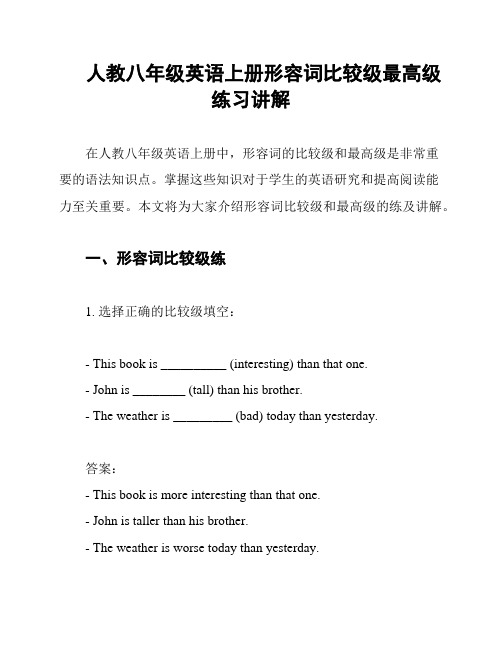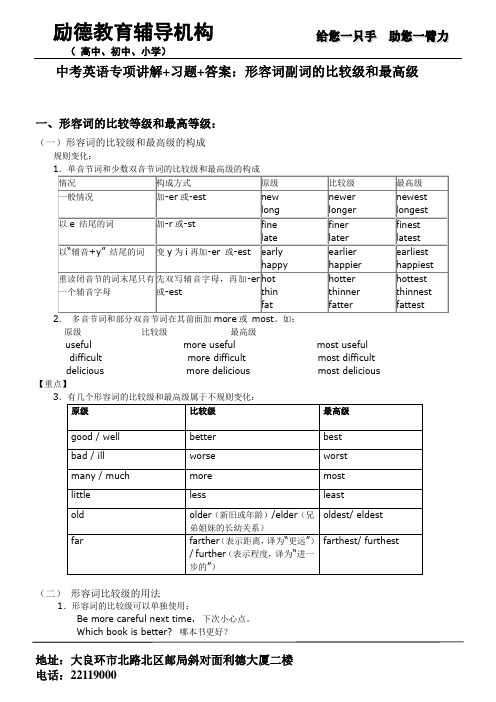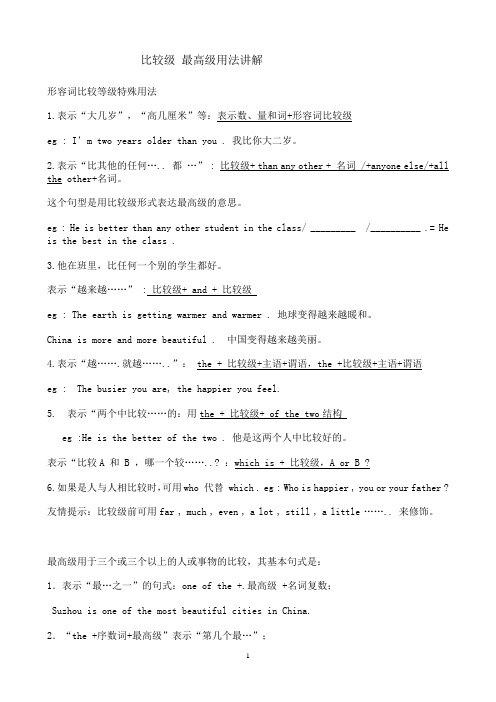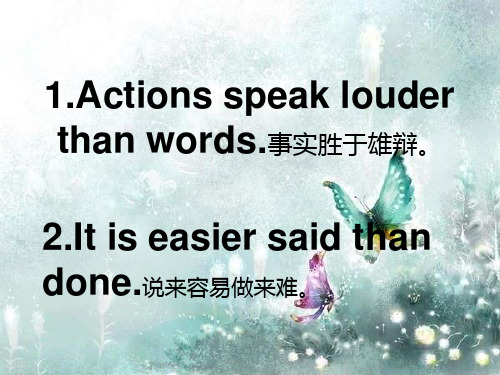初中英语比较级-最高级-讲解及练习(全)
初中英语比较级和最高级讲解与练习

初中英语比较级和最高级讲解与练习形容词比较级和最高级一.绝大多数形容词有三种形式,原级,比较级和最高级, 以表示形容词说明的性质在程度上的不同。
1. 形容词的原级: 形容词的原级形式就是词典中出现的形容词的原形。
例如: poor tallgreat glad bad2. 形容词的比较级和最高级: 形容词的比较级和最高级形式是在形容词的原级形式的基础上变化的。
分为规则变化和不规则变化。
二.形容词比较级和最高级规则变化如下:1) 单音节形容词的比较级和最高级形式是在词尾加-er 和-est 构成。
great (原级) greater(比较级) greatest(最高级)2) 以-e 结尾的单音节形容词的比较级和最高级是在词尾加-r 和-st 构成。
wide (原级) wider (比较级) widest (最高级)3) 少数以-y, -er, -ow, -ble结尾的双音节形容词的比较级和最高级是在词尾加-er 和-est构成。
clever(原级) cleverer(比较级) cleverest(最高级),slow(原级) slower(比较级) slowest (最高级)4) 以-y 结尾,但-y 前是辅音字母的形容词的比较级和最高级是把-y 去掉,加上-ier和-est 构成.happy (原形) happier (比较级) happiest (最高级)5) 以一个辅音字母结尾其前面的元音字母发短元音的形容词的比较级和最高级是双写该辅音字母然后再加-er和-est。
原形比较级最高级原形比较级最高级big bigger biggest hot hotter hottestred redder reddest thin thinner thinnest6) 双音节和多音节形容词的比较级和最高级需用more 和most 加在形容词前面来构成。
原形比较级最高级careful careful more careful most carefuldifficult more difficult most difficultdelicious more delicious most delicious7)常用的不规则变化的形容词的比较级和最高级:原级比较级最高级good better best 好的well better best 身体好的bad worse worst 坏的ill worse worst 病的many more most 许多much more most 许多few less least 少数几个little less least 少数一点儿(little littler littlest 小的)far further furthest 远(指更进一步,深度。
人教八年级英语上册形容词比较级最高级练习讲解

人教八年级英语上册形容词比较级最高级练习讲解在人教八年级英语上册中,形容词的比较级和最高级是非常重要的语法知识点。
掌握这些知识对于学生的英语研究和提高阅读能力至关重要。
本文将为大家介绍形容词比较级和最高级的练及讲解。
一、形容词比较级练1. 选择正确的比较级填空:- This book is __________ (interesting) than that one.- John is ________ (tall) than his brother.- The weather is _________ (bad) today than yesterday.答案:- This book is more interesting than that one.- John is taller than his brother.- The weather is worse today than yesterday.2. 改写句子,使用比较级:- Tom is tall.- This car is expensive.- Our house is big.答案:- Tom is taller.- This car is more expensive.- Our house is bigger.二、形容词最高级练1. 选择正确的最高级填空:- She is the _______ (beautiful) girl in the class. - This is the _______ (tall) building in the city. - It is the _______ (busy) street in town.答案:- She is the most beautiful girl in the class.- This is the tallest building in the city.- It is the busiest street in town.2. 改写句子,使用最高级:- The blue dress is pretty.- This restaurant is popular.- That movie is interesting.答案:- The blue dress is the prettiest.- This restaurant is the most popular.- That movie is the most interesting.形容词的比较级和最高级的研究要点:在比较级中,我们通常在形容词前加上more,或者在单音节形容词和部分双音节形容词后加-er。
(完整版)中考英语形容词副词的比较级最高级专项讲解+习题+答案

励德教育辅导机构( 高中、初中、小学)地址:大良环市北路北区邮局斜对面利德大厦二楼中考英语专项讲解+习题+答案:形容词副词的比较级和最高级一、形容词的比较等级和最高等级:(一)形容词的比较级和最高级的构成规则变化:原级 比较级 最高级useful more useful most useful difficult more difficult most difficult delicious more delicious most delicious 【重点】3(二) 形容词比较级的用法1.形容词的比较级可以单独使用:Be more careful next time. 下次小心点。
Which book is better? 哪本书更好?2.也可以和than连用,表示两者相比,than后可以跟:a. 名词或代词:He is older than me / I . 他年龄比我大。
b. 动名词:Skiing is more exciting than skating. 滑雪比滑冰更刺激。
c. 从句:I was a better singer than he was. 我唱歌比他好。
(三)形容词比较级的修饰语修饰形容词,副词比较级的常用修饰词有:no, a little, a bit, much, even, still, a lot, a great deal, far, by far, rather, any等.1)只用于修饰比较级的:much;still;even2)既可以修饰比较级又可以修饰原级的:a little; a bit; rather 等。
3)在这些词中,其中no在修饰比较级时,在意义上否定两者,表示前者在某方面不比后者强多少.He is no richer than Peter. 他不比彼得富裕多少.=He is as poor as Peter.他和彼得一样穷.表示前者比后者强一点时,通常采用a little,a bit等.The room is a bit larger than that one.这个房间比那个稍大一点.4)表示前者比后者强很多时,通常采用much,even,still等.(still修饰形容词,副词的比较级时,可以位于比较级之前或之后.)He works still harder than ever. =He works harder still than ever.他比以往更加努力学习了.5)表示前者在某方面远远地超过对方时,通常采用far,by far,a lot,a great deal等.Matters are a lot better than ever before. 情况远远比以往好.6)在否定句,疑问句或条件状语从句中,修饰形容词,副词的比较级,只能用any来修饰.He can't jump any higher. 他不能跳得更高了.Can he jump any higher? 他能跳得更高一些吗?Do you feel any better today? 你今天感觉好一点了吗?If you can jump any higher, I will give you a prize.如果你能跳得更高些,我就奖励你.7)比较级前还可加其他表示数量的词:My sister is ten years younger than me. 我妹妹比我小十岁。
英语形容词比较级和最高级讲解与练习

初中英语形容词比较级和最高级讲解与练习在英语中元音特别响亮,一个元音(a e i o u共五个)可构成一个音节,一个元音可以和一个元音构成音节,一个元音和一个或几个辅音音素结合也可以构成一个音节。
英语单词音节是根据单词中所包含的元音——请注意不是元音字母——来划分的。
一般来说,一个单词中有几个元音,也就有几个音节。
如not,map,have,life,night,twelfth都是单音节词;像sleep,heart,wheat,weak,coat,join,pear这样的单词,其中的元音字母都是共同发一个元音,也是单音节(注:双元音也要看做一个元音)。
(这样的单词从语音学来讲应划归“字母组合音节”。
英语的单词可分为七种音节——开音节、闭音节、r音节、re 音节、双r音节、成音节、字母组合音节。
)像begin,about,ago,royal,ancient,modern这样的单词都属双音节。
但是要注意,在middle,little,apple,castle,simple,able,saddle这样的单词中,尽管只有一个元音,也是双音节词,原因是词尾的(注意:只能是在词尾时)“辅音字母+le”中就是没有元音,也构成音节,被称作“成音节”。
由元音字母a,e,i,o,u,y(一般都说英语只有五个元音字母,其实是六个)与辅音字母R(-ar,-er,-ir,-or,-ur,-yr)构成的音节叫作"R音节“。
如:car,bar,mark,dark,her,shirt,girl,sir,sport,short,torch,nurse,burn,purse等。
像murder,prefer,martyr,grammar,doctor,person,girdle,article,artificial等单词中的-ar,-er,-ir,-or,-ur,-yr都属"R音节“。
而由元音字母a,e,i,o,u,y与RE(-are,-ere,-ire,-ore,-ure,-yre)构成的音节叫作"RE音节“。
八年级英语上比较级最高级讲解与练习

比较级最高级用法讲解形容词比较等级特殊用法1.表示“大几岁”,“高几厘米”等:表示数、量和词+形容词比较级eg : I’m two years older than you . 我比你大二岁。
2.表示“比其他的任何….. 都…” : 比较级+ than any other + 名词 /+anyone else/+all the other+名词。
这个句型是用比较级形式表达最高级的意思。
eg : He is better than any other student in the class/ _________ /__________ .= He is the best in the class .3.他在班里,比任何一个别的学生都好。
表示“越来越……” : 比较级+ and + 比较级eg : The earth is getting warmer and warmer . 地球变得越来越暖和。
China is more and more beautiful . 中国变得越来越美丽。
4.表示“越…….就越……..”: the + 比较级+主语+谓语,the +比较级+主语+谓语eg : The busier you are, the happier you feel.5. 表示“两个中比较……的:用the + 比较级+ of the two结构eg :He is the better of the two . 他是这两个人中比较好的。
表示“比较A 和 B ,哪一个较……..?:which is + 比较级,A or B ?6.如果是人与人相比较时,可用who 代替 which . eg : Who is happier , you or your father ?友情提示:比较级前可用far , much , even , a lot , still , a little …….. 来修饰。
最高级用于三个或三个以上的人或事物的比较,其基本句式是:1.表示“最…之一”的句式:one of the +.最高级 +名词复数;Suzhou is one of the most beautiful cities in China.2.“the +序数词+最高级”表示“第几个最…”;The Yellow River is the second longest river in China3.当最高级前有物主代词或名词所有格时,不加the ;Monday is my busiest day.Jack is Jim’s best friend.4.比较级与最高级的转换;如上语法针对性训练一、用括号中所给动词的正确形式填空1.Hong Kong is ________________ ( hot ) than Shanghai .2.My coat is _________________ ( new ) than yours .3..Which is ______________ ( interesting ), this book or that one .4..He becomes _____________ and ____________ ( thin ) .5.The _______________ ( much ) you eat , the _______________ ( fat ) you are !6..This coat is the ________________ ( cheap ) of the two .7.He is much ________________ ( heavy ) this year .8.Which lesson is __________ (difficult) in Book 2?9.That was one of _________( exciting) moments in 2008.10.He is _____________________(clever )boy in the class..11.I am only one year __________________ (young) than you..12.He ran ____________ than all the others. He ran ____________of all. (fast)13..James played as ____________ as you. Mary played ____________of all. (well)14.The Huanghe River is the second_____________________(long) river in China.。
初中英语形容词比较级讲解(含具体练习)

形容词、副词 比较等级的用法
Task1:如何表达甲与乙在某方面相同或不同?
1. 我的学校和你的一样新 My school is as new as yours. 2. 他英语说地和你一样好. He speaks English as well as you. 3.牛肉不及猪肉美味.
Beef is not as/so delicious as pork.
A. larger B. less C. smaller D. bigger
注意
① 在含有连词than的比较级中,前后的比 较对象必须是同一范畴,即同类事物之间 的比较。
1.Actions speak louder than words.事实胜于雄辩。
2.It is easier said than done.说来容易做来难。
形容词、副词 比较级与最高级
一、规则变化:
1、一般直接在词尾加er; est
e.g. long—longer--longest fast—faster--fastest 2、以字母e结尾的直接加但r“; s形t + ly ”构成的副词除外 如:quickly—more quickly—most
Chinese is much more difficult than English.
比较级前可用表示程度的副词修饰,如 much, a little, even, far ,a bit , ,a lot,, four years old等
Task3:中译英并归纳
1. 春天天气变得越来越暖和
It’s getting warmer and warmer in spring.
考点1.“A + be +形容词比较级 + than + B”,意思为“A比B 更……”。
比较级最高级讲解及练习
比较级最高级讲解及练习(精)(总13页)--本页仅作为文档封面,使用时请直接删除即可----内页可以根据需求调整合适字体及大小--形容词、副词比较级和最高级知识详解专练一、概说英语中的形容词和副词有三个等级,即原级、比较级和高最级。
比较级主要用于两者比较,最高级主要用于多者比较。
二、比较等级的构成1. 通过加后缀-er和-est构成。
单音节和部分双音节词通过加后缀–er和-est构成比较级和最高级原级比较级最高级tall(高) taller tallestquiet(安静的) quieter quietestearly(早) earlier earliest注:(1) 若原级以字母e结尾,则只加-r和-st:fine—finer—finest。
(2) 若原级以“辅音字母+y”结尾,则应将y改为i,再加-er和-est构成比较级和最高级:dry—drier—driest。
(例外:shy(害羞的)—shyer—shyest)(3) 若原级为重读闭音节结尾,且末尾只有一个辅音字母,则双写这个辅音字母后加词尾-er和-est构成比较级和最高级:big—bigger—biggest。
2. 通过在其前加more和most构成。
多音节和部分双音节词通过在其前加more和most构成比较级和最高级:原级比较级最高级difficult(困难的) more difficult most difficultdangerous(危险的) more dangerous most dangerousbravely(勇敢地) more bravely most bravely注:(1) 有的双音节词(如 clever, common, gentle, handsome, happy, narrow, polite, quiet, shallow, simple, stupid,often, seldom)可以有两种方式构成比较级和最高级级:clever—cleverer / more clever —cleverest / most cleveroften—more often / oftener—most often / oftenest。
形容词的比较级和最高级知识讲解及练习整理
形容词的比较级和最高级知识讲解及练习整理一、形容词比较级的讲解与练习1.1 形容词比较级的定义形容词比较级是用来表示两个事物在某一方面的程度差异。
在英语中,形容词比较级通常在词尾加上“-er”,如tall(高的)和taller(更高的)。
也有一些形容词的比较级是通过改变元音和辅音来实现的,如good(好的)和better(更好的)。
有些形容词的比较级是不规则的,需要我们熟记,如bad(差的)和worse(更差的)。
1.2 形容词比较级的用法形容词比较级主要用于以下几个方面:(1)在两个人或物之间进行比较。
例如:Tom is taller than Jerry.(汤姆比杰瑞高。
)(2)在描述一个事物随着时间、空间或其他因素的变化而变化时。
例如:The weather is getting colder and colder.(天气越来越冷了。
)(3)在描述一个事物在某一方面的程度时。
例如:This book is more interesting than that one.(这本书比那本书有趣。
)1.3 形容词比较级的练习为了更好地掌握形容词比较级,我们可以通过以下几种方式进行练习:(1)阅读:通过阅读文章、书籍等,了解形容词比较级的用法和不规则形式。
例如,读《小王子》时,我们可以学到good(好的)和better(更好的)的区别。
(2)听力:通过收听英语广播、观看英语电影等,提高自己对形容词比较级的敏感度。
例如,我们可以听到Tom says he is taller than Jerry.(汤姆说他比杰瑞高。
)(3)写作:在写作过程中,尽量使用形容词比较级,以提高自己的表达能力。
例如,我们可以写一篇关于自己身高变化的文章:I used to be short, but now I'm taller.(我以前很矮,现在长得高了。
)二、形容词最高级的知识讲解与练习2.1 形容词最高级的概念形容词最高级是用来表示三个或三个以上事物在某一方面的程度差异中的最高级别。
(word完整版)英语比较级和最高级讲解及练习
(word完整版)英语⽐较级和最⾼级讲解及练习⽐较级和最⾼级的讲解变化规则1.⼀般单⾳节词和少数以-er,-ow结尾的双⾳节词,⽐较级在后⾯加-er,最⾼级在后⾯加-est;(1)单⾳节词如:small→smaller→smallestshort→shorter→shortesttall→taller→tallestgreat→greater→greatest(2)双⾳节词如:clever→cleverer→cleverestnarrow→narrower→narrowest2.以不发⾳e结尾的单⾳节词,⽐较在原级后加-r,最⾼级在原级后加-st;如:large→larger→largest nice→nicer→nicest able→abler→ablest3.在重读闭⾳节(即:辅⾳+元⾳+辅⾳)中,先双写末尾的辅⾳字母,⽐较级加-er,最⾼级加-est;如:big→bigger→biggest hot→hotter→hottest fat→fatter→fattest4.以“辅⾳字母+y”结尾的双⾳节词,把y改为i,⽐较级加-er,最⾼级加-est;如:easy→easier→easiest heavy→heavier→heaviestbusy→busier→busiest happy→happier→happiest5.其他双⾳节词和多⾳节词,⽐较级在前⾯加more,最⾼级在前⾯加most;如:beautiful→more beautiful→most beautifuldifferent→more different→most differenteasily→more easily→most easily注意:(1)形容词最⾼级前通常必须⽤定冠词the,副词最⾼级前可不⽤。
例句:The Sahara is the biggest desert in the world.(2)形容词most前⾯没有the,不表⽰最⾼级的含义,只表⽰"⾮常"。
形容词的比较级和最高级知识讲解及练习整理
形容词的比较级和最高级知识讲解及练习整理在英语学习中,形容词的比较级和最高级是非常重要的语法知识点。
它们用于描述事物之间的程度差异,让我们的表达更加准确和丰富。
接下来,让我们一起深入了解一下形容词的比较级和最高级的相关知识,并通过一些练习来巩固所学。
一、形容词比较级和最高级的构成规则1、一般情况下,直接在形容词词尾加 er 构成比较级,加 est 构成最高级。
比如:small smaller smallesttall taller tallest2、以不发音的字母e 结尾的形容词,直接在词尾加r 构成比较级,加 st 构成最高级。
例如:nice nicer nicestwide wider widest3、重读闭音节结尾且末尾只有一个辅音字母的形容词,要先双写这个辅音字母,然后再加 er 构成比较级,加 est 构成最高级。
比如:big bigger biggesthot hotter hottest4、以“辅音字母+y”结尾的形容词,要先把 y 变为 i,再加 er 构成比较级,加 est 构成最高级。
例如:happy happier happiestheavy heavier heaviest5、部分双音节和多音节形容词,在词前加 more 构成比较级,加most 构成最高级。
比如:beautiful more beautiful most beautifulimportant more important most important二、形容词比较级和最高级的用法1、比较级的用法表示两者之间的比较,常用“than”连接。
例如:He is taller than me(他比我高。
)可以用“much / a lot / far +比较级”表示“……得多”,“a little /a bit +比较级”表示“……一点儿”。
比如:This book is much more interesting than that one(这本书比那本有趣得多。
- 1、下载文档前请自行甄别文档内容的完整性,平台不提供额外的编辑、内容补充、找答案等附加服务。
- 2、"仅部分预览"的文档,不可在线预览部分如存在完整性等问题,可反馈申请退款(可完整预览的文档不适用该条件!)。
- 3、如文档侵犯您的权益,请联系客服反馈,我们会尽快为您处理(人工客服工作时间:9:00-18:30)。
形容词比较级、最高级练习(一)一般句式的构成: A + is / are+ 形容词比较级+ than + BA 是主格B 是宾格如: She is taller than me. 主格形容词比较级宾格(二)英语形容词比较级的构成英语形容词比较等级有三个:原级,比较级和最高级。
形容词比较等级形式变化有规则的和不规则的两种。
规则变化1)单音节词末尾加-er(比较级),-est(最高级)【例】原级比较级最高级great greater greatest small smaller smallest clean cleaner cleanest2)单音节如以e结尾,只加-r(比较级),-st(最高级)【例】 fine finer finest wide wider widest3)闭音节单音节词如末尾只有一个辅音字母,须先双写这个辅音字母,再加-er(比较级),-est(最高级)【例】 big bigger biggest hot hotter hottest red redder reddest4)少数以-y,-er,ow,-ble结尾的双音节词,末尾加-er(比较级),-est(最高级)。
以-y结尾的词,如-y前是辅音字母,则变y为-i,再加-er和-est。
以-e结尾的词只加-r和-st。
【例】 clever cleverer cleverest narrow narrower narrowestable abler ablest easy easier easiest5)其它双音节和多音节词皆在前面加单词more和most。
【例】 careful more careful most careful difficult more difficult most difficultdelicious more delicious most delicious不规则变化原级比较级最高级good------better------best many------more------most much------more------mostbad------worse------worst far------farther, further------farthest, furthest 形容词前如加 less 和 least 则表示"较不"和"最不"important 重要 less important 较不重要 least important 最不重要注:有些形容词一般没有比较等级。
如: right, wrong, woolen等。
形容词的比较等级的用法:比较级用于二者的比较。
【例】 Li Ping is older than Wang Hai. 李平比王海年纪大。
There are more students in Class One than in Class Two.一班比二班学生多。
二、形容词各等级的用法:1、原级(同级)比较:as…as…; not as(so)…as…We’ll give you as much help as we can.She isn’t as(so)active in sports as before.2. 比较级:表示两者之间比…… 更……可用状语much, a little, even等修饰: He made fewer mistakes than I did. He is even richer than I.3、高级:形容词最高级前必须加the, 副词最高级前常省略the,后面多用of……,in……短语表示范围:It was the most/least interesting story I have ever listened. He is the tallest of the three.4、如果在两者之间表示“最……”时要在比较级前加the,而且还用of the two, of the pair短语:John is the clever of the two boys. Of the two boys, John is the clever.三、重点与难点:1、as…as…结构:你和汤姆是一样好的孩子。
You’re a boy as good as Tom.=You’re as good a boy as Tom.2、(1)too…to与so…that ’t…的句型转换:前者为简单句,主语只有一个,而后者为复合句,主语有两个,试比较:The milk was too hot to drink. The milk was so hot that we can’t drink it.(2) too…to…与 not enough to句型的转换:He is too young to get married.=He is not old enough to get married.The book is too difficult for me to read.=The book is not easy enough for me to read.3、形容词原级表示比较级含义:约翰不象迈克那么苯。
John is not so stupid as Mike.John is less stupid than Mike. John is cleverer than Mike.4、用比较级表示最高级:约翰是班里最高的男生。
John is taller than any other boy in the class.John is the tallest boy in the class. John is taller than :any other boy.any of the other boy./all the other boy./any of the others./any one else.5、the more….. the more….表示“越……越……”:The more books you read, the wider your knowledge is.The more food you eat, the fatter you are.6、more and more….表示“越来……越……”:More and more students realized the importance of a foreign language.Our country is getting stronger and stronger.英语语法之形容词比较级和最高级练习题1. This box is___ that one.A. heavy thanB. so heavy thanC. heavier asD. as heavy as2 When we speak to people, we should be ' .A. as polite as possibleB. as polite as possiblyC. as politely as possibleD. as politely as possibly3 This book is____ that one, but____ than that one.A. as difficult as; expensiveB. as more difficult as; more expensiveC. as difficult as; more expensiveD. more difficult as; as expensive4 I think the story is not so ___ as that one.A. interestingB. interestedC. more interestingD. most interesting5 His father began to work____ he was seven years old.A. as old asB. as early asC. sinceD. while6. I think science is _ than Japanese.A. much importantB. importantC. much more importantD. more much important7. This pencil is___ than that one.A. longestB. longC. longerD. as long8. My mother is no ___ young.A. shorterB. longerC. littleD. few9. These children are ____ this year than they were last year.A. more tallB. more tallerC. very tallerD. much taller10. It was very hot yesterday, but it is___ today.A. even hotterB. more hotterC. much more hotD. much hot11. Mrs Black has got____ instead of getting any better.A. more badB. a little worseC. much badlyD. a lot of worse12. When we arrived, we found the meeting room crowded with___ students.A. quite a fewB. only a fewC. fewD. a few quitehouse is small for a family of six.A. much tooB. too muchC. very muchthe window we can see nothing but ____ buildings.A. tall very manyB. very many tallC. very tall manyD. many very tal一、写出以下各形容词的比较级和最高级:1. nice __________ _________2. fat _________ ________3. slow _________________4. dry _________ _________5. happy ________ _________6. wet ________ _________7. much ________ _________ 8. ill _____ _________9. little _____________________10. bad ________ _________11. thin _________ _________ 12. far ____________________13. early _______ ______ 14. careful_______ ____ 15. exciting _____ ___ _二、根据句意,用所括号内所级形容词的比较等级形式填空:1. Bob is _________ ( young ) than Fred but ___________ (tall) than Fred.2. Yingtian is not as ___________ (tall) as Yongxian.3. Almost all the students' faces are the same but Li Deming looks _______(fat) thanbefore .is _________ (heavy), a hen or a chickenHow _________ (tall) is Sally-- She' s metres ________ (tall). What about Xiaoling -- She' s only metres ________(tall). She is much _______(short) than Sally.She is also the _______ (short) girl in the class.6. He is ______ (bad) at learning maths. He is much _______ (bad) at Chinese andhe is the _________ (bad) at English.7. Annie says Sally is the ________ (kind) person in the world.is one of the_______ __(friendly) people in the class, I think.9. A dictionary is much (expensive) than a story-book.10. An orange ia a little ______ (big) than an apple, but much ________ (small) thana watermelon.11. The Changjiang River is the _______ (long) river in China.12. Sue is a little _________ __ (beautiful) than her sister.room is not as _________ (big) as my brother' s.difficult is physics --I' m not sure.-- Is it ________ (difficult) than maths -- I don' t think so.Annie plays the piano very ___________ (well).-- Sue plays it _____ (well) than Annie. And Sally plays it the _______(well).三、翻译句子:1、谁比Jim年纪大是你。
